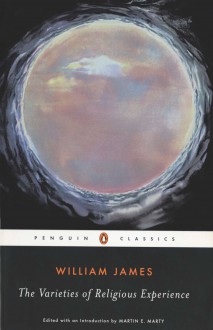
I wanted to like this classic book, but I can't do it: too many things are wrong. A shame, because I completely approve of the idea. William James, writing around the end of the 19th century, sets out to take a cool look at how people experience religious feeling, basing his investigation on state-of-the-art psychological theory. What do we discover, and what do the findings tell us about the nature of religion? For the first two or three chapters, I enjoyed it and thought it was going in a good direction. James is evidently intelligent and well-read, and he's capable of writing excellent prose. Unfortunately, it rapidly started going off the rails in several ways.
First, the style. Yes, James is able to write wonderfully, but a lot of the time he seems to have lost all sense of self-criticism. Above all, he just won't cut anything: the book could comfortably have been shortened to half its length. Looking around, I see many editions which have far fewer pages, so I'm guessing that some editors have done just that. In the original version, which I read, he has endless, repetitious quotations, often stuffed into footnotes which can go on (literally) for two or three pages. It's worse than
Infinite Jest, where at least the footnotes are intentionally annoying and often funny. These are anything but.
Next, the science. All well and good to say you'll use up-to-date psychological theory: but psychology at that time was barely a science at all, and it shows. The "scientific" explanations are in most cases not much more than hand-waving and fanciful ideas with Latin names. There are no experiments, no statistics, no falsifiable claims. It's just a mass of case studies, selected and reported according to criteria that are never in any way made clear. Just: oh, this is interesting, let's stick it in. When you cherry-pick your data this way, you can prove anything.
To be fair, James does have an informal plan for selecting his examples, but it's one that I feel very dubious about. He says he will focus on the most extreme examples of religious feeling, since it is in such cases that we will see it in its purest form. We are thus treated to hundreds of pages of quotations from born-again converts, saints and mystics. The greater part of these passages are tedious in the extreme: few of the people in question write well. And, more important, I am not at all sure I agree that religious feeling is best studied in these extreme cases. There's an analogy which suggested itself to me more than once. Imagine that most people never experienced sexual desire, and you wanted to investigate the minority who claimed that they knew it from their own experience. I would definitely not start by reading accounts of people who were into extreme BDSM;
The Story of O is interesting in its perverse way, but it would probably give you all sorts of odd ideas about what sex was like. I hate to say this, but some of the saints James discusses rather reminded me of O.
At the end, I was surprised to see James unequivocally claiming that he thought religious feeling was a good thing, and that its object was some definite spiritual reality. I do wonder if he truly believed this. If he did, why pick such bizarre and unconvincing examples? I am quite capable of being moved by religious authors: for example, I love
The Divine Comedy,
Ash Wednesday, Jan Kjærstad's Jonas Wergeland trilogy, Flaubert's
La tentation de saint Antoine and Selma Lagerlöf's
Jerusalem, to name just a few. If James had actually wanted to convince his readers, I think he could have done better. He says himself that he was a person who never experienced religious feeling much at first hand; you often get the impression that he was rather sceptical about it. He is certainly quite willing to poke fun at many of the subjects he quotes.
All in all, then, an annoying and frustrating book. If you're interested in these matters, I'd instead recommend reading Gide's
La porte étroite and
L'immoraliste, and Smullyan's
Planet Without Laughter. They're shorter, better written, and, in my humble opinion, considerably more insightful.
 Foreword to the Centenary Edition, by Micky James
Foreword to the Centenary Edition, by Micky James
 Log in with Facebook
Log in with Facebook 







